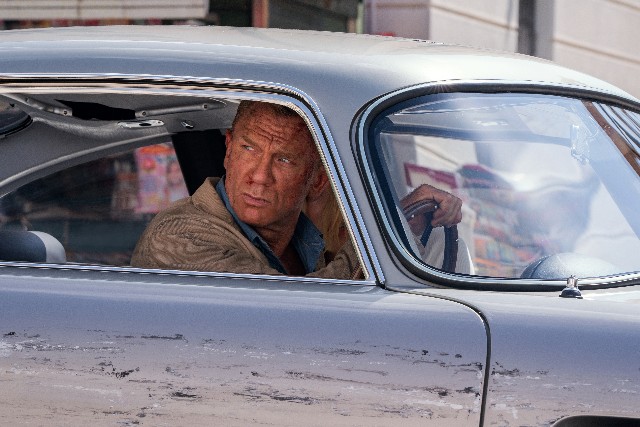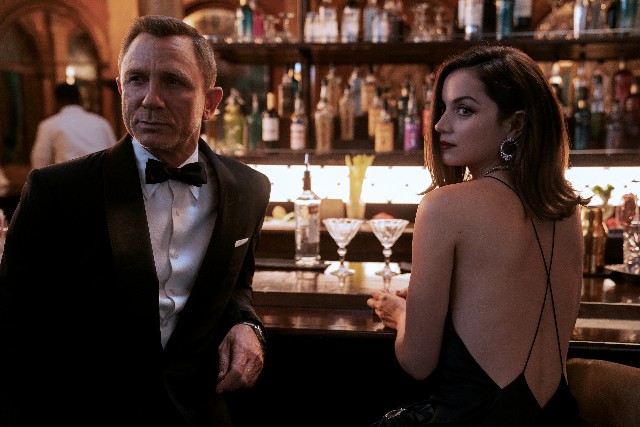No Time to Die Movie Review
 |
No Time to Die
Theatrical Release: October 8, 2021 Running Time: 163 Minutes Rating: PG-13 Director: Cary Joji Fukunaga Writers: Neal Purvis, Robert Wade, Cary Joji Fukunaga (story & screenplay); Phoebe Waller-Bridge (screenplay); Ian Fleming (characters) Cast: Daniel Craig (James Bond), Léa Seydoux (Madeleine), Rami Malek (Lyutsifer Safin), Lashana Lynch (Nomi), Ralph Fiennes (M), Ben Whishaw (Q), Naomie Harris (Moneypenny), Rory Kinnear (Tanner), Jeffrey Wright (Felix Leiter), Billy Magnussen (Logan Ash), Christoph Waltz (Ernst Blofeld), David Dencik (Valdo Obruchev), Ana de Armas (Paloma), Dali Benssalah (Primo/Cyclops) Lisa-Dorah Sonnet (Mathilde) |
We may not be done with COVID-19 just yet, but the film industry celebrates a noteworthy milestone on October 8th. On that day, we finally see the theatrical release of No Time to Die,
As has become the norm for sporadic post-pandemic critics screenings, this one was preceded by a short video of Craig welcoming the film's first viewers and justifying the delay as a necessity. It's tough to argue, since Bond movies have always premiered in theaters, for almost sixty years now. Perhaps more than any other series, too, Bond movies benefit from large screen viewing and suffer from the smaller screens on which it would have been streamed had it followed the path of many other films impacted by the novel coronavirus.
No Time to Die's cinematic power is felt immediately and often. A dazzling prologue provides backstory in and around a remote, snowy European lake house. Then in impossibly scenic Italian countryside, we catch up with the retired Bond and his current love, Madeleine Swann (Lea Seydoux). You're forgiven if you don't remember this partner, because she was introduced in Spectre six falls ago, a movie not well remembered for anything (except maybe Sam Smith's Oscar-winning theme tune "Writing's on the Wall"). Bond and Madeleine are married and happy, but he's still looking over his shoulder and hasn't forgotten a lost love who seemed to capture his heart more fully a few movies back.
It isn't long before marital bliss gives way to more on-brand excitement. Bond is soon narrowly escaping death, dramatically riding a motorcycle up flights of stairs, and questioning everything he knows.
Of course these predicaments demand that Bond return to his agency, which has reassigned his hallowed 007 number to a spunky agent named Nomi (Captain Marvel's Lashana Lunch). If you think this is the film's way of setting up the franchise for a post-Craig world where James Bond is now a woman of color, you're almost certainly wrong. That'd be a trendy move in progressive modern cinema, but Eon Productions isn't so self-sabotaging and the banter between the legendary 007 and the new one remains, well, just banter.
For something more in tune with the times, Bond has to confront a potent new threat of genetically targeted biological warfare. This requires him to reconnect with incarcerated old foe Ernst Blofeld (Christoph Waltz) and eventually leads us to our principal villain of the piece, the facially disfigured Lyutsifer Safin (Rami Malek). The film takes its sweet time to reveal Safin and to do anything else, running a staggering 163 minutes, a new record for the franchise.
Safin is not as strong or compelling a character as the film around him and No Time does suffer a bit as a result. Still, writer-director Cary Joji Fukunaga (Beasts of No Nation, Craig's tenure as Bond has undoubtedly reinvigorated a franchise that inevitably requires reinvigoration every few years. Skyfall (2012) is the gold standard for modern action and 2005's Casino Royale is even slightly more highly regarded by the fanbase. No Time lands closer to those two highs than the middling Spectre (2015) and the much-maligned Quantum of Solace (2008). But it's not quite the dynamite send-off it aims to be, swinging for the fences and ending up with a stand-up double. Its emotional coda does not resonate quite as much as it yearns to. If Skyfall is The Dark Knight, then this is The Dark Knight Rises, a technically formidable finale that will nonetheless draw some vocal detractors among the generally satisfied masses.
The one thing all should be able to agree upon is that No Time to Die is flashy cinema that begs to be seen on the big screen. Hopefully enough people around the globe to make the first film delayed by COVID-19 the first post-COVID film to inspire rampant moviegoing once again.
|
Related Reviews:
DVDizzy.com | DVD and Blu-ray Reviews | Search This Site
DVDizzy.com Top Stories:
Spectre
Text copyright 2021 DVDizzy.com. Images copyright 2021 MGM and United Artists Releasing.
Unauthorized reproduction prohibited.

